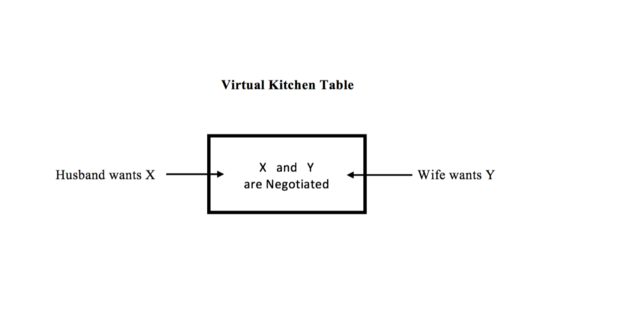Marriage
The Right Way to Negotiate With Your Partner
Collaborative negotiation can help your marriage be fair and equal.
Posted February 15, 2019 Reviewed by Jessica Schrader
Let’s change fundamentally the way we think about being married so that you and your partner can create the kind of life you want together—and in the process help change our society. I propose that marriage be conceived as the collaborative negotiation of partners around their individual and joint life plans—plans that are not dictated by gender roles or gender traits—which can replace the old model of marriage driven by the motif of gender. Negotiating collaboratively begins with both husband and wife being able to identify his/her wants in any given situation. These wishes are stated and the reasons for them are provided. It is as if each of you put these wishes on a virtual kitchen table where agreement, differences, and disagreements become apparent. From this perspective, differences and disagreements are on the table between you not exclusively within either of you.
The schematic below depicts the idea that wants are openly stated, looked at side by side, and negotiated so that a win-win outcome can occur. The schematic depicts clearly the idea that disagreements and/or differences are between the two of you not within either of you.

The negotiation that takes place in marriage is not the kind that one sees in business where each party is trying to maximize his/her own gain at the expense of the other. Nor is it a quid pro quo (tit for tat; you do this for me, and I will do that for you) kind of negotiation. Negotiating collaboratively has the following characteristics: (1) each partner understands that his/her spouse is a valuable person in the same way that he/she is, (2) each partner is able to identify wants and desires, (3) each partner is willing to negotiate his/her wants and desires, (4) each partner can explain (not justify) what is important about the stated wants and desires, (5) neither partner seeks to “privilege” his or her wants and desires over the other’s because of one’s status such as gender or wage earner, (6) each partner is willing to take action based on the negotiation of wants and desires, and (7) each partner is willing to learn and change based on the outcomes of actions taken.
Taking Collaboration Seriously
A committed marriage is a life-long partnership, which links two people around their most fundamental desires to flourish as individuals and as a couple. This requires great attention to the maintenance of a collaborative environment of negotiation. Here are some thoughts about what collaboration means.[1]
- Collaborators are equal. True collaborators are always equals and each partner accepts full responsibility for his/her part in the process of negotiation. Collaboration requires the sharing of authority and an acceptance of personal responsibility to negotiate in good faith.
- Collaboration is not capitulation. Collaboration protects individual autonomy. Most of us have a (possibly subconscious) fear of being overwhelmed by someone and are reluctant to surrender any part of our autonomy in a relationship.
- Collaboration is not cooperation. Collaboration is about the process of working together, while cooperation is about the result of working together. For example, I can cooperate with you by stepping aside while you do what you want to do.
Sociologists believe that gender remains a central motif in heterosexual marriage because the idea of masculinity and femininity are acted out in marriage. Sociologist Sara Berk has described marriage as a “gender factory”—i.e., husbands and wives demonstrate their masculinity/femininity in the way they interact around everyday household activities, childcare, and displays of affection for one another.[2] When we carry out these gender roles in marriage, we subconsciously assume it is because of innate gender differences in masculinity and femininity. This reinforces the idea that marriage should be organized by gender. Collaborative negotiation is a new vision of how we can understand marriage. Collaboration derives from the unique qualities and contribution of the collaborators; it is not determined by gender. If either of you does not participate as fully engaged and equal partners, it might as well be one person making the decisions.
Negotiating Collaboratively Is About Commitment
Most people think the idea of commitment between husband and wife is about staying together through thick and thin. This is what is called an “aspirational” statement, what you believe should occur, and hope will occur, in your marriage. The commitment to negotiate collaboratively around the issues that you will face during your marriage is the hard work needed to achieve this aspiration. The willingness to negotiate issues in good faith with your spouse is so important that I believe it rises to the level of a vow you are willing to make and remake throughout your marriage.
Takeaways
- A new approach is needed to achieve an equitable, sustainable marriage.
- This approach is to organize marriage around negotiating wishes and wants collaboratively.
- Marriage can no longer be organized around the gender of the partners.
- Collaboration between equal partners is neither capitulation nor cooperation.
- There is not a managing partner in an equal partnership.
- Negotiating collaboratively with one another is about commitment to the marriage.
References
1. Coulson, Christopher. “What is Collaboration?” DynamicLivingTM. http://www.santafecoach.com/dl/oct03.htm#parting.
2. Berk, Sarah Fenstermaker. The Gender Factor: The Apportionment of Work in American Households. New York: Plenum, 1985.


